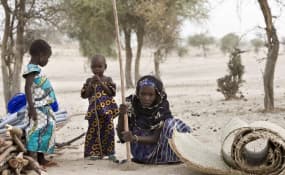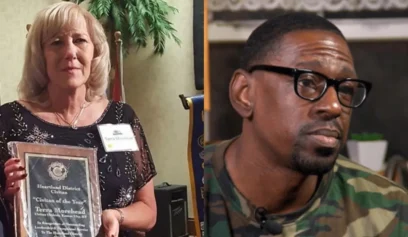
Nigerian refugee Boussam installs a pole to start building a shelter in Sayam Forage camp, in Niger’s Diffa region. Photo by Helene Caux/UNHCR
Maiduguri — Over 15,000 people have been killed and 2 million displaced in Nigeria, Chad, Niger and Cameroon
With more than one million people living in camps around Nigeria’s northeastern city of Maiduguri, having fled their homes due to Boko Haram attacks, some are finding innovative ways to rebuild businesses from scratch.
Many of the displaced arrived at the camps with no money or possessions, leaving them totally dependent on the government and humanitarian organisations for their day-to-day survival.
Despite the harsh conditions of the camps, which host up to 30,000 residents, entrepreneurial spirit is not in short supply.
Several of those uprooted by the Islamist militant group, such as shopkeeper Modu Mustafa, have launched profit-making businesses within internally displaced persons (IDP) camps.
Mustafa saw his opportunity when the former governor of Borno state visited the camp where he resides in Maiduguri, home to 4,000 people, and gave the families there bags of rice.
Rather than eat the rice with his two wives and 10 children, 45-year-old Mustafa decided to sell it for 8,000 naira ($40) and used the money to open a kiosk in his family’s tent – selling items ranging from biscuits and batteries to salt and sugar.
“In one month, I make about 20,000 naira ($100) and use the money to feed my family,” he said, adding that the food provided by the state and aid agencies was not sufficient for his family.
Maiduguri has been inundated in the past three years by people fleeing Boko Haram, sending the city’s population surging to two million from some 600,000 and putting pressure on housing, health, food, and water supplies, aid agencies say.
More than 15,000 people have been killed and 2 million displaced in Nigeria and neighbouring Chad, Niger and Cameroon during the militant group’s seven-year insurgency to carve out an Islamist caliphate.
While nine in 10 of the displaced who arrive in Maiduguri find accommodation with host families, the rest reside in the city’s 22 government camps, or live in informal, makeshift settlements dotted outside of the capital of Borno state.
Read more here.


